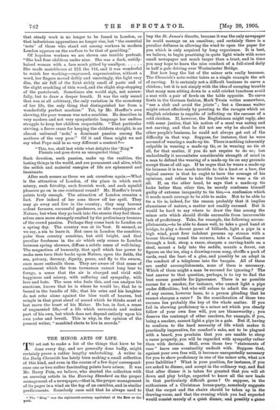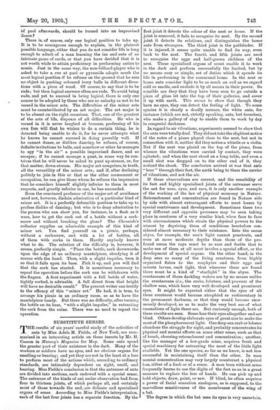THE MINOR ARTS OF LIFE.
TO set out to make a list of the things that have to be done every day, and are generally done badly, might certainly prove a rather lengthy undertaking. A writer in the Daily Chronicle has lately been making a small collection of this kind, and even in the course of a few days' correspond- ence one or two rather fascinating points have arisen. It was Mr. Barry Pain, we believe, who started the collection with an amusing article in the Evening Standard on the proper management of a newspaper,—that is, the proper management of its pages in a wind on the top of an omnibus, and in similar predicaments. Somebody once said that he always used to buy the St. James's Gazette, because it was the only newspaper he could manage on an omnibus; and certainly there is- a peculiar deftness in allowing the wind to open the paper for you which is only acquired by long experience. It is best, we believe, to begin practising in quite light winds with some small newspaper not much larger than a tract, and in time you may hope to learn the nice conduct of a full-sized daily in half a gale driving over Westminster Bridge.
But how long the list of the minor arts really becomes. The Chronicle's note-writer takes as a single example the art of carving. It is certainly not a difficult business to carve a chicken; but it is not simply with the idea of escaping trouble that many men sitting down to a cold cricket luncheon avoid a seat with a pair of fowls on the table opposite. To carve fowls in the German fashion, Mark Twain writes somewhere, " use a club and avoid the joints" ; but a German waiter might retort effectively by pointing to the ravages which an English cricketer is capable of inflicting on the carcase of a cold chicken. If, however, the Englishman might reply, also with some justice, that his notion of a meal was eating and not carving, and that he did not see why he should learn other people's business, he could not always get out of the difficulty in that way. Suppose, for instance, that he were accused of wearing a made-up tie. There is nothing inherently culpable in wearing a made-up tie, or in wearing no tie at all, for that matter, if you do not require to do so ; but undoubtedly it necessitates considerable strength of mind in a man to defend the wearing of a made-up tie on any grounds except those of old age. If he urges that he wears a made-up tie because it is too much trouble to tie a knot or a bow, the logical answer is that he ought to have the courage of his opinions, and refuse to take the trouble to wear a tie at all. If, on the other hand, he says that a made-up tie looks better than other ties, he merely confesses himself guilty of extreme incapacity to tie ties,—a confession which it needs much courage to be able to make. Not to be able to tie a tie is, indeed, for the reason probably that it implies clumsiness of nature, a matter not readily excused. But it would be hard to say where to draw the line among the minor arts which should divide excusable from inexcusable lack of proficiency. Take, for example, the following accom- plishments,—to be able to dance well, to take a good hand at bridge, to play a decent game of billiards, light a pipe in a high wind, punt four indolent persons up stream with a breeze blowing round the corners, take a Canadian canoe through a lock, strop a razor, sharpen a carving-knife on a steel, mount a lady into the saddle, muzzle a ferret, cut figures on the ice, sing a drawing-room song, shuffle a pack of cards, read the bass, of a glee, and possibly be an adept in the conduct of a telephone into the bargain. All of these are useful accomplishments, none of them is necessary. Which of them might a man be excused for ignoring P The best answer to that question, perhaps, is to try to find the best excuse possible for [ignorance. There is no possible excuse for a smoker, for instance, who cannot light a pipe under difficulties ; but who will refuse to admit the cogency of any excuse, however lame, to a person pleading that he cannot sharpen a razor ? In the consideration of those two excuses lies probably the key of the whole matter. If you fail in showing proficiency in a minor art which you clearly follow of your own free will, you are blameworthy ; you deserve the contempt of other smokers, for example, if you, being a smoker, cannot light a pipe in a gale. But if, having to conform to the hard necessity of life which makes it practically imperative, for comfort's sake, not to be plagued with a beard, you proclaim that you are unable to strop a razor properly, you will be regarded with sympathy rather than with derision. Still, even those two " statements of case " leave one eventuality undealt with. Suppose that, against your own free will, it becomes unexpectedly necessary for you to show proficiency in one of the minor arts, what are your liabilities P What is your position, for instance, if you are asked to dinner, and accept in the ordinary way, and find that after dinner it is taken for granted that you will sit down and play bridge, expected to know all the new leads in that particularly difficult game ? Or suppose, in the enthusiasm of a Christmas house-party, somebody suggests that the carpet and the chairs should be taken up in the drawing-room, and that the evening which you had expected would consist merely of a quiet dinner, and possibly a game
of, pool afterwards, should be turned into an improvised 'dance P
There is, of course, only one logical position to take up. It is to be courageous enough to explain, in the plainest possible language, either that you do not consider life is long enough to admit of a man learning the ins and outs of an intricate game of cards, or that you have decided that it is not worth while to attain proficiency in performing antics to music. Just in the same way, the non-billiard-player who is asked to take a cue at pool or pyramids adopts much the most logical position if he refuses on the ground that he sees no object in pushing coloured ivory balls in different direc- tions with a piece of wood. Of course, to say that is to be rude ; but then logical answers often are rude. To avoid being rude, and yet to succeed in being logical, there is only one course to be adopted by those who are so unlucky as not to be versed in the minor arts. The difficulties of the minor arts must be counterblasted by an art major. The art major is to be absent on the right occasions. That, one of the greatest of the arts of life, disposes of all difficulties. He who is versed in it is never laughed at because, professing of his own free will that he wishes to do, a certain thing, he is detected being unable to do it, for he never attempts what he knows he cannot succeed in doing passably well. If he cannot dance, or dislikes dancing, he refuses, of course, definite invitations to balls, and somehow or other he manages to spy "in the air" a possible improvised dance, and so escapes ; if he cannot manage a punt, in some way he con- trives that he will never be asked to punt up-stream, or, for that matter, down-stream. His major art comprises, in truth, all the versatility of the minor arts ; and if, after declining politely to join in this or that or the other amusement or occupation, he can give those whom he refuses the impression that he considers himself slightly inferior to them in most respects, and greatly inferior in one, he has succeeded.
Even the convinced professor of the major art of avoidance need not, however, disdain admiration of a particular kind of minor art. It is a perfectly defensible position to take up to profess dislike of dancing; but who is to deny admiration to the person who can show you, for instance, in a flash as it were, how to get the cork out of a bottle without a cork- screw and without breaking the glass P The Chronicle's collector supplies an admirable example of this kind of minor art. You find yourself on a picnic, perhaps, without a corkscrew, and with a lot of bottles, all of them with corks in them. Hardly anybody knows what to do. The solution of the difficulty is, however, it seems, perfectly simple. " Place the bottle, cork downwards, upon the edge of an ordinary mantelpiece, steadying it of course with the hand. Then, with a slight impulse, turn it so that it falls upon its base. Pick it up, and you will find that the cork has started. It is sometimes necessary to repeat the operation before the cork can be withdrawn with the fingers. A first experiment with a full bottle of water, tightly corked, is advisable. A fall direct from that height will have no desirable result." The present writer can testify to the efficacy of this " minor art." He had, it is true, to arrange his picnic in an ordinary room, so as to have the mantelpiece bandy. But there was no difficulty, after turning the bottle on its base, "with a slight impulse," in extracting the cork from the ruins. There was no need to repeat the operation.







































 Previous page
Previous page